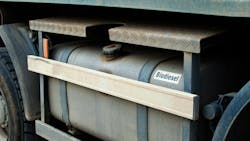This year marks the seventh year that Minnesota is requiring bulk diesel sold and delivered to tanks that fuel diesel equipment, such as construction equipment, truck fleets, farm equipment and generators to transition toward a 20% biodiesel blend (B20) during the summer months.
According to the Minnesota Soybean Research and Promotion Council (MSR&PC), Minnesota made history in 2018 by becoming the first state to enact a B20 minimum blending requirement.
Between the months of October through March, the state requires all diesel to contain at least 5% biodiesel (B5), from April 1-14, all diesel must contain at least 10% (B10) biodiesel. Starting April 15, all diesel must contain a 20% biodiesel blend through the rest of the summer.
Read also: Renewable diesel holds promise for fleet sustainability
According to MSR&PC, using a B20 blend in the summer and B5 in the winter equates to removing the emissions from nearly a quarter of a million vehicles from Minnesota roads every year. Biodiesel makes a significant economic impact, contributing nearly $1.7 billion towards Minnesota’s GDP and supports nearly 5,400 full time jobs in the state.
“The biodiesel industry provides significant value for our soybean farmers in Minnesota. Every gallon of biodiesel sold contributes more than a dollar per bushel for our farmers,” said Mike Youngerberg, senior director of product development and commercialization MSR&PC, in a statement. “On top of that, studies show that biodiesel is a proven, reliable solution to address climate and energy concerns.”
Minnesota produces approximately 85 million gallons of the renewable fuel annually through their biodiesel plants in Albert Lea, Brewster and Isanti.
About the Author
Harlee Hewitt
Harlee is a former associate editor for Construction Equipment.
